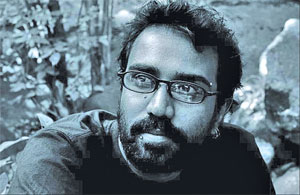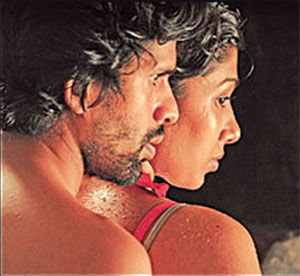|
A challenge for the 'privileged cinema culture':
How I wonder what you are
By Anuradha KODAGODA
Chinthana Dharmadasa is a young filmmaker and script writer who could
blaze the trail in Sri Lankan alternative cinema.
His first short film was Afterwards, he fell asleep which was
selected for the best category in shorts 2005 film festival organised by
National Film Corporation, and as a recognition he received a
scholarship for one year for film training in Lodz Film School in
Poland.
|

Chinthana Dharmadasa |
How I wonder what you are is his first feature film which he had
written and directed with his friend Udaya Dharmawardhana.
This was the first time in Sri Lankan cinema history that two
directors have collaborated in one production.
On the other hand, with How I wonder what you are, Chinthana and
Udaya are challenging the 'privilege cinema culture' in Sri Lanka by
introducing a low budget film, which now has become a popular, upcoming
trend in the cinema industry.
Chinthana is the core-script writer of the film Alone In A Valley by
Boodi Keerthisena.
He was involved in script writing of the international award winning
film Flying Fish by Sanjeewa Pushpakumara. Chinthana is now into his
second feature film Les Papillions Noirs which is a France-Sri Lanka
co-production again with the collaboration of Udaya Dharmawardhana.
This is an interview the Sunday Observer had with the talented youth
of Sri Lankan cinema.
Question: What is the
background of 'How I wonder what you are?'
Answer: A few years ago,
making a film was only a dream for us with the enormous budgets that it
required to produce a better production.
Those days we were not familiar with low budget films and such
technology or methods had not been introduced to the Sri Lankan cinema.
Udaya and I were very close friends for some years and How I wonder what
you are, is our very own life experience which we could capture into
celluloid after several years.
It was a depressed chapter in our lives; where there was no hope,
passion or recognition left for us. All the other friends and people
around us had something or other to keep them occupied; we were out of
that crowd and simply we were nobodies.
However, the insatiable desire we had towards the cinema, kept our
hopes alive and we wanted to create our own life's tragedy into an art
piece and at the same time we wanted to challenge the so-called
stereotypical format which is common not only in Sri Lankan cinema but
in many aspects of Sri Lankan society.
That's how the film How I wonder what you are was created with the
lowest budget in Sri Lankan history of Cinema.
 Q: What do you identify or
understand as cinema? Q: What do you identify or
understand as cinema?
A: When it comes to cinema
there are so many categories such as world cinema, Asian cinema and
European cinema. However, out of them I know only about Sri Lankan
cinema and unfortunately as per my observation, Sri Lankan cinema has
never existed.
There were prominent characters such as Lester James Peries,
Pathiraja, Dharmasiri who achieved international recognition for their
creations, but my perception on Sri Lankan cinema is different.
The main reason for the non-existence of Sri Lankan cinema is that we
don't have a film industry in our country and we don't have the
cinematic language or industrial space created to identify the cinematic
methods or culture as same.
There were others such as Titus Thotawattha, Mahagamasekara,
Sugathapala Senarath Yapa and Herbert Ranjith Peries who were not
recognised by the international film festival market, but who had the
real sense and touch of Sri Lankan culture in their creations.
It is unfortunate that we still could not create a dialogue towards
this unrecognised trend, which I identified in their creations as the
real feeling of Sri Lankan cinema.
Q: Most of the themes in
alternative cinema are restricted the ungratefulness or sadness of lives
in third world countries. Why?
A: The themes of the
alternative cinema in the world are changing very often and the
realistic art form is no more there in the scene. So far there were many
trends such as realistic form, magical realism, and post modernism and
now it has changed to touch the human's unconsciousness. That means
universally the film language is developing and evolving frequently.
When it comes to Sri Lankan alternative cinema, still it is mainly
based on Buddhism, Marxism or most of the story lines are always keen on
finding the absolute truth of life.
That is because we have not understood the film language yet and
still we are trapped in a modern thinking pattern.
For me, cinema is a medium of entertainment which we can use as a
tool to express a feeling, a mood or any human expression.
Q: Today we see so many
upcoming filmmakers being introduced to the industry. What is your
opinion about the alternative cinema in the country?
A: There are so many
newcomers getting into the short film-making, but unfortunately it
creates an erroneous trend which is not a good sign in the long run.
I believe a short film is not a suitable structure to the Sri Lankan
audience. I believe, to have an enthusiastic short film culture, it is
essential to have a strong mainstream cinema in the country, because the
short film is always a sub-culture which is generated due to a strong
mainstream cinema industry. Therefore, my suggestion for short
filmmakers is to produce 90 minutes short films which would be more
meaningful when considering the socio-cultural factors in the country.
Q: Why did you want to
become a filmmaker?
A: Actually I still don't
think I'm a film-maker; rather I'm a writer.
However, I could visualise my writings and I think my visuals are
more powerful than my language. Therefore, I tried to shoot or visualise
what I write.
However, I have still not mastered my skills in editing, camera
tricks, techniques and many technical sides of film making but I'm more
conscious about developing powerful scripts.
Q: Do you have any role
models in the film industry?
A: I have many. I'm
getting inspired by many film directors and script writers in different
areas.
As an ideological base I like Mexican film-maker Alejandro Gonzalez a
lot and when it comes to entertainment base I like Quentin Tarantino and
from managing and directing the acting crew, I like Carlos Reygadas.
When it comes to Sri Lankan films I like 'Para Dige'.
It's a mystery and I really can't believe that a Sri Lankan
film-maker has done it.
However, I think the credit should go to script writer Ajith
Thilakasena who is a fabulous writer. Likewise, there are many
international and local script writers and directors that I got
inspiration from, but I never wanted to be anybody's follower. |

